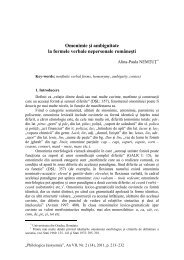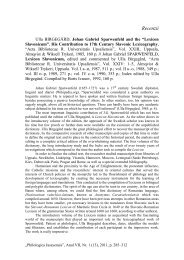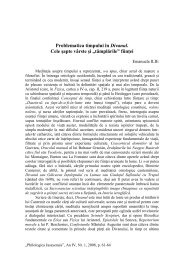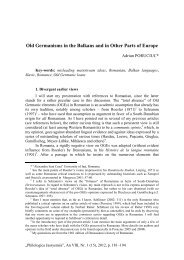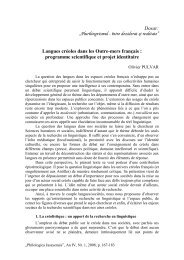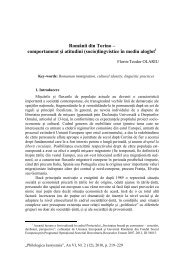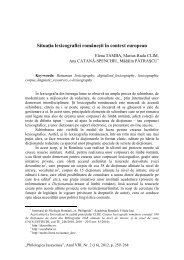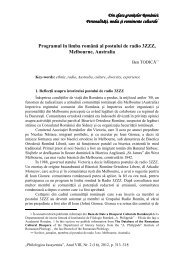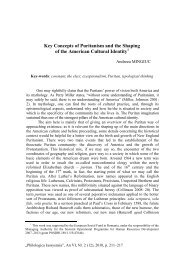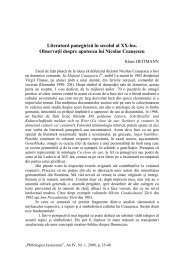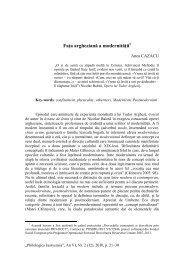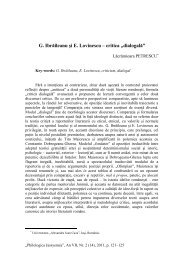The Poetics and Politics of Travel - Philologica Jassyensia
The Poetics and Politics of Travel - Philologica Jassyensia
The Poetics and Politics of Travel - Philologica Jassyensia
You also want an ePaper? Increase the reach of your titles
YUMPU automatically turns print PDFs into web optimized ePapers that Google loves.
<strong>The</strong> <strong>Poetics</strong> <strong>and</strong> <strong>Politics</strong> <strong>of</strong> <strong>Travel</strong>: an Overview<br />
<strong>Philologica</strong> <strong>Jassyensia</strong>, An II, Nr. 2, 2006, p. 159-167<br />
Carmen ANDRAŞ<br />
“<strong>Travel</strong> has a way <strong>of</strong> stretching the mind. <strong>The</strong><br />
stretch comes not from travel’s immediate rewards,<br />
the inevitable myriad new sights, smells <strong>and</strong><br />
sounds, but with experiencing firsth<strong>and</strong> how others<br />
do differently what we believed to be the right <strong>and</strong><br />
only way” (Ralph Crawshaw).<br />
It is largely agreed upon the fact that, for a great part, histories <strong>of</strong> civilizations<br />
are also histories <strong>of</strong> travels, mobilities, migrations, <strong>and</strong> their integration in new<br />
topographies (journeys, exodus, nomadism, pilgrimage, emigration, exploration,<br />
dislocations <strong>of</strong> populations, etc.). Histories <strong>of</strong> civilizations are also covering the<br />
recording (under the form <strong>of</strong> travel accounts <strong>and</strong> travel literature, documents, maps,<br />
illustrations, etc.) <strong>and</strong> the reception <strong>of</strong> the respective experiences by the public. James<br />
Clifford synthesizes the definition <strong>of</strong> travel in close relation with translation: “My<br />
expansive use <strong>of</strong> “travel” goes a certain distance <strong>and</strong> falls apart into nonequivalents,<br />
overlapping experiences marked by different translation terms: “diaspora”, “borderl<strong>and</strong>”,<br />
“immigration”, “migrancy”, “tourism”, “pilgrimage”, “exile”. […] given the historical<br />
contingency <strong>of</strong> translations, there is no single location from which a full comparative<br />
account could be produced” (Clifford 1997: 11). Michel Butor extends the activities <strong>of</strong><br />
travel beyond tourism, including in exchange reading <strong>and</strong> writing together with<br />
“nomadism”, “settlement” <strong>and</strong> “exodus”, exploration, pilgrimage, emigration, business<br />
trips or round-trips (Butor 1974).<br />
<strong>The</strong> theme <strong>of</strong> travel is currently approached from the perspectives <strong>of</strong> imagology,<br />
travel studies (“les études viatiques” in French 1 ), cultural <strong>and</strong> postcolonial studies,<br />
history, literature, geography, cartography, cultural anthropology, sociology,<br />
semiology 2 , political sciences <strong>and</strong> other related domains <strong>of</strong> research, which encompass<br />
the discussion <strong>of</strong> themes like: the histories <strong>of</strong> travel <strong>and</strong> the travel <strong>of</strong> histories, the<br />
1 See: http://www.crlv.org/ Centre de Recherche sur la Littérature des Voyages, Université de Sorbonne.<br />
2 Semiologies <strong>of</strong> <strong>Travel</strong> by David Scott is the first book to explore comprehensively the role <strong>of</strong><br />
semiology <strong>and</strong> signs in the encounter with foreign cultures as it is expressed in French travel writing. David<br />
Scott focuses on major writers <strong>of</strong> the last two hundred years, including Théophile Gautier, André Gide,<br />
Henri Michaux, Michel Leiris, Claude Lévi-Strauss, Rol<strong>and</strong> Barthes <strong>and</strong> Jean Baudrillard, to show how<br />
ethnology, politics, sociology <strong>and</strong> semiotics, as well as literature, are deeply bound up in travel experience<br />
<strong>and</strong> the writing that emerges from it. Scott also shows how the concerns <strong>of</strong> Romantic writers <strong>and</strong> theorists<br />
are still relevant to reflections on travel in today’s post-modern world. <strong>The</strong> book follows an itinerary through<br />
jungle, desert <strong>and</strong> Utopia, as well as through Disneyl<strong>and</strong> <strong>and</strong> Chinese restaurants, <strong>and</strong> will be <strong>of</strong> interest to<br />
specialists in French studies <strong>and</strong> cultural studies as well as to readers <strong>of</strong> travel writing.
Carmen ANDRAŞ<br />
_______________________________________________________________________________________________________________________________________________________________________________________________<br />
relationship between travel – knowledge – power, between history <strong>and</strong> anthropology,<br />
discourses <strong>of</strong> identities <strong>and</strong>/or difference, the maps <strong>of</strong> travel <strong>and</strong> travel <strong>of</strong> maps, the<br />
poetics <strong>of</strong> the exile, or the definition <strong>of</strong> borders as spaces <strong>of</strong> intercultural <strong>and</strong><br />
international communication <strong>and</strong> / or conflicts, the definition <strong>of</strong> travel accounts as<br />
documents <strong>and</strong> / or literature, etc. In Michel de Certeau’s words, travel narratives<br />
“constitute interdisciplinary laboratories” where a vast range <strong>of</strong> fields <strong>and</strong> discourses<br />
converge” <strong>and</strong> an “everyday practice” (Certeau 1991: 115, 222)<br />
<strong>Travel</strong> is <strong>of</strong>ten interpreted as a metaphor “by which we discuss other<br />
fundamental activities <strong>of</strong> life: we speak <strong>of</strong> our lives as a journey from death to birth <strong>and</strong><br />
education as the road to knowledge. <strong>The</strong> journey is the metaphor by which we describe<br />
the mind’s workings, our flights <strong>of</strong> fancy <strong>and</strong> imaginative adventures….” (Robertson<br />
2001: XI). <strong>The</strong> journey is our “<strong>Travel</strong>ing in the unconscious” (Cixous 1993: 70). <strong>Travel</strong><br />
<strong>and</strong> mobility are crucial factors <strong>of</strong> histories, geographies, nations <strong>and</strong> cultures, most<br />
important in the contemporary endeavors toward globalization, trans - culturalism <strong>and</strong> -<br />
nationalism. Homi Bhabha in <strong>The</strong> Location <strong>of</strong> Culture calls this globalization <strong>of</strong><br />
mobility “the new internationalism” (Bhabha 1994: 5).<br />
<strong>Poetics</strong> <strong>of</strong> travel (literature) play with its ambivalence, suggesting the travel’s<br />
in-betweenness: pleasure <strong>of</strong> travel or travel <strong>of</strong> pleasure, literatures <strong>of</strong> travel or travel <strong>of</strong><br />
literatures, cultures <strong>of</strong> travel or travel <strong>of</strong> cultures, theory <strong>of</strong> travel or travel <strong>of</strong> theory,<br />
education <strong>of</strong> travel or travel <strong>of</strong> education, histories <strong>of</strong> travel or travel <strong>of</strong> histories etc.<br />
<strong>The</strong> debate upon the art/science <strong>of</strong> travel (writing) continues to be <strong>of</strong> interest. Within the<br />
context <strong>of</strong> the heterogeneous genre <strong>of</strong> the travelogue <strong>and</strong> <strong>of</strong> today’s age <strong>of</strong> globalization,<br />
CNN, <strong>and</strong> the internet, the poetics <strong>of</strong> travel literature is based largely on travel books,<br />
accounts <strong>and</strong> memoirs. One <strong>of</strong> their chief characteristics nowadays is that they all<br />
demonstrate a paradoxical resistance both to the very idea <strong>of</strong> travel(ing) as such <strong>and</strong> to<br />
the mimetic rhetoric <strong>of</strong> traditional travel narratives. <strong>Poetics</strong> <strong>of</strong> contemporary travel<br />
literature try to underline how these modern or postmodern texts question, revisit,<br />
subvert or reject such key notions <strong>of</strong> travel literature as exoticism, nostalgia, exile,<br />
nomadism, otherness or foreignness/selfhood, home/abroad, dwelling/traveling (which,<br />
in fact, cannot be separated; see James Clifford on “global commercialism”, in <strong>Travel</strong>ing<br />
Cultures). <strong>Poetics</strong> <strong>of</strong> travel <strong>and</strong> movement reflect upon the disembodiment <strong>of</strong> mobility<br />
<strong>and</strong> communication, the dislocation <strong>of</strong> space, the relation space-time (the chronotopes):<br />
“Telecommunications technologies, such as the telephone, radio or television, have<br />
made it possible to overcome territorial distances, have solved the problem <strong>of</strong><br />
communication between geographically separated individuals, <strong>and</strong> have opened up the<br />
possibility <strong>of</strong> sending ‘disembodied’ messages; all this has been based on one<br />
fundamental concept; the conversion <strong>of</strong> space into time” (Gianetti 2001: 162).<br />
<strong>Politics</strong> <strong>of</strong> travel focus on the role <strong>of</strong> travel in the formation <strong>of</strong> identity, <strong>and</strong> the<br />
travel-knowledge-power relations, which involve other pairs <strong>of</strong> relations between<br />
center-periphery, identity-difference, power-geography, mobility-passivity, the West-the<br />
East or the Orient (the Balkans).<br />
In fact poetics <strong>and</strong> politics <strong>of</strong> travel (literature) cannot be totally separated as<br />
methodologies <strong>of</strong> studying travel <strong>and</strong> its related concepts: poetics <strong>and</strong> politics <strong>of</strong><br />
location/dislocation, for example.<br />
<strong>The</strong> word travel in English has a French origin, initially “travail” <strong>and</strong> meant – as<br />
it still does with that spelling – “bodily or mental labour or toil, especially <strong>of</strong> a painful<br />
160
<strong>The</strong> <strong>Poetics</strong> <strong>and</strong> <strong>Politics</strong> <strong>of</strong> <strong>Travel</strong>: an Overview<br />
_______________________________________________________________________________________________________________________________________________________________________________________________<br />
or oppressive nature; exertion; trouble; hardship; suffering”. “Nothing about pleasure”,<br />
as Wykes rightly notices. In the past, travel was extremely painful <strong>and</strong> <strong>of</strong>ten unsafe.<br />
Indeed, the last source <strong>of</strong> the word “travel” is a medieval instrument <strong>of</strong> torture – the<br />
trepalium – a mechanism would perforate its victim’s flesh with three pointed stakes<br />
(tres “three” <strong>and</strong> palus “stake”). <strong>The</strong> trepalium became a verb, trepaliare, which meant<br />
any form <strong>of</strong> torture, from torture to the Old French concept <strong>of</strong> travailler – or “putting<br />
oneself to pain or trouble”. Travailler came to mean “work hard” in French. English<br />
borrowed the word as “travail” <strong>and</strong> this, in turn, was used to describe a tiresome<br />
journey-travel. <strong>The</strong> French language, on the other h<strong>and</strong>, never regarded travel with the same<br />
sense <strong>of</strong> uneasiness as did English. Voyager ‘to travel’ comes from the Latin via, or “way”.<br />
And even travel, accordingly spelt, is defined unhappily as the “act <strong>of</strong> travelling<br />
or journeying”, “a movement through space that changes the location <strong>of</strong> something” or<br />
“the act <strong>of</strong> going from one place to another.” 3 As a verb, it means nothing more than “to<br />
journey over, to pass, to journey on foot or in a vehicle, to tour abroad” (Irvine 1967:<br />
1093). Defined by Wikipedia, “<strong>Travel</strong> is the transport <strong>of</strong> people on a trip or journey.<br />
Reasons for travel include: *Tourism – travel for recreation. This may apply to the<br />
travel itself, or the travel may just be the necessary investment to arrive at a desired<br />
location. *Visiting friends <strong>and</strong> family*Trade*Commuting – going to various routine<br />
activities, such as work or meetings.*Migration – travel to began life somewhere else;<br />
nomadic people do this*Pilgrimages – travel for religious reasons” 4 . We can also learn<br />
from dictionaries that “A travel image is one that captures the feeling <strong>of</strong> place <strong>and</strong> time,<br />
<strong>and</strong> portrays a l<strong>and</strong>, people or culture in its natural state. It may be taken either in a<br />
foreign l<strong>and</strong> or anywhere in one’s own country. Excluded are ultra close-ups which lose<br />
their identity, studio-type model images, or images that have been obviously<br />
manipulated. <strong>The</strong> title is read before showing the image. It should indicate the location<br />
(town & country) <strong>and</strong> should complement the image” 5 . “Nothing about the fulfilment <strong>of</strong><br />
the spirit, curiosity, the excitement <strong>of</strong> unfamiliar surroundings, or the amazement<br />
generated by marvels”, Wykes concludes (Wykes 1973: 13). <strong>Travel</strong> always had<br />
pragmatic aims, so very obvious in its Anglo-American hypostases 6 . Nevertheless,<br />
during the 17th-18th centuries, pleasurable romantic <strong>and</strong> educational travel were going<br />
to impose themselves besides the pragmatic hypostases <strong>of</strong> travel.<br />
In the twentieth century, travel writing came to be an object <strong>of</strong> study in its own<br />
right, <strong>and</strong> the last two decades have seen a steady stream <strong>of</strong> publications that have<br />
sought to map out the history <strong>of</strong> travel writing, to theorize it, <strong>and</strong> to investigate key<br />
3<br />
wordnet.princeton.edu/perl/webwn <strong>and</strong> Cambridge Advanced Learner's Dictionary: http://dictionary.<br />
cambridge.org/cald/<br />
4<br />
en.wikipedia.org/wiki/<strong>Travel</strong><br />
5<br />
www.pacamera.com/categyDef.html<br />
6<br />
Journey is a “day’s travel”. <strong>The</strong> word comes originally from Latin via French. <strong>The</strong> Latin word dies,<br />
meaning ‘day’, led to diurnus, or ‘daily’ <strong>and</strong> then to the vulgar Latin word diurnata (modern Italian<br />
“giornata”) which became jornee in Old French (journée today). <strong>The</strong> specific notion <strong>of</strong> a day’s travel<br />
appears to have faded out <strong>of</strong> English during the 16th Century. Tour comes from Latin via French. <strong>The</strong> Latin<br />
word tornus means ‘lathe’, hence ‘to turn’. It took on the meaning <strong>of</strong> a circuitous journey only in the 17th<br />
century. <strong>The</strong> term was popularised when, in the 18th century, it became fashionable for English young men<br />
<strong>of</strong> breeding to go on a Gr<strong>and</strong> Tour <strong>of</strong> Continental Europe. However, it was not until about 1800 that the<br />
term 'tourist' was first used.<br />
161
Carmen ANDRAŞ<br />
_______________________________________________________________________________________________________________________________________________________________________________________________<br />
questions <strong>of</strong> ethics <strong>and</strong> issues <strong>of</strong> identity. Mary Louise Pratt’s important study <strong>of</strong><br />
colonial l<strong>and</strong>scape, the works <strong>of</strong> James Clifford <strong>and</strong> Paul Fussell, the growing number<br />
<strong>of</strong> studies deriving from work in cultural geography, representation theory, <strong>and</strong><br />
postcolonial studies have resulted in a rich fund <strong>of</strong> secondary materials that complement<br />
the primary texts produced by travel writers.<br />
Paul Fussel’s Abroad is a reading <strong>of</strong> British “literary travelling” between the<br />
two world wars. He distinguishes three types: explorers, travellers <strong>and</strong> tourists.<br />
Explorers, he writes, like Francis Drake <strong>and</strong> Edmund Hillary, <strong>of</strong>ten end up with<br />
knighthoods. “No traveler, <strong>and</strong> certainly no tourist, is ever knighted for his<br />
performances, notices Paul Fussell, although the strains he may undergo can be as<br />
memorable as the explorer’s.” While “the explorer seeks the undiscovered, the traveler<br />
that has been discovered by the mind working in history, the tourist that which has been<br />
discovered by entrepreneurship <strong>and</strong> prepared for him by the arts <strong>of</strong> mass publicity. <strong>The</strong><br />
genuine traveler is, or used to be, in the middle between the two extremes. If the<br />
explorer moves toward the risks <strong>of</strong> the formless <strong>and</strong> the unknown, the tourist moves<br />
toward the security <strong>of</strong> pure cliché. It is between these two poles that the traveler<br />
mediates, retaining all he can <strong>of</strong> the excitement <strong>of</strong> the unpredictable attaching to<br />
exploration, <strong>and</strong> fusing that with the pleasure <strong>of</strong> ‘knowing where one is’ belonging to<br />
tourism” (Fussell 1980: 39).<br />
“But travel is work”, Paul Fussell observes. “Before the development <strong>of</strong><br />
tourism, travel was conceived to be like study, <strong>and</strong> its fruits were considered to be the<br />
adornment <strong>of</strong> the mind <strong>and</strong> the formation <strong>of</strong> the judgment. <strong>The</strong> traveler was a student <strong>of</strong><br />
what he sought, <strong>and</strong> he was assisted by aids like the 34 volumes <strong>of</strong> the Medieval Town<br />
Series, now, significantly, out <strong>of</strong> print. One by-product <strong>of</strong> real travel was something that<br />
has virtually disappeared, the travel book as a record <strong>of</strong> an inquiry on the mind <strong>and</strong><br />
imagination <strong>of</strong> the traveler. Lawrence’s Italian journeys, says Anthony Burgess, ‘by<br />
post-bus or cold late train or on foot are in that great laborious tradition which produced<br />
genuine travel books’. And Paul <strong>The</strong>roux, whose book <strong>The</strong> Great Railway Bazaar is one<br />
<strong>of</strong> the few travel books to emerge from our age <strong>of</strong> tourism, observes that ‘travel writing<br />
is a funny thing’ because ‘the worst trips make the best reading, which is why Graham<br />
Greene’s <strong>The</strong> Lawless Roads <strong>and</strong> Kinglake’s Eothen was so superb.’ On the other h<strong>and</strong>,<br />
easy, passive travel results in books which <strong>of</strong>fer ‘little more than chatting,’ or, like<br />
former British Prime Minister Edward Heath’s <strong>Travel</strong>s, ‘smug boasting’. ‘Let the tourist<br />
be cushioned against misadventure,’ says Lawrence Durrell; ‘your true traveler will not<br />
feel that he has had his money's worth unless he brings back a few scars.’” And, as<br />
Fussell concludes, “If exploration promised adventures, travel was travel because it held<br />
out high hopes <strong>of</strong> misadventures”. In what tourism is concerned, Paul Fussell asserts:<br />
“As I have said, it is hard to be a snob <strong>and</strong> a tourist at the same time. A way to combine<br />
both roles is to become an anti-tourist. Despite the suffering he undergoes, the antitourist<br />
is not to be confused with the traveler: his motive is not inquiry but selfprotection<br />
<strong>and</strong> vanity” (Fussell 1980: 39-40).<br />
In his analysis <strong>of</strong> Paul Fussell’s book, published in Inscriptions, an e-magazine,<br />
James Clifford distinguishes an “assumed topography, an already ‘worlded’ world (as<br />
Gayatri Spivak might put it) underlying Fussell’s vision. <strong>The</strong> explorer ‘seeks’ the<br />
undiscovered; he <strong>and</strong> the other voyagers ‘move toward’ different experiences,<br />
discoveries. However formless or unknown the places an explorer visits (<strong>and</strong> this is a<br />
162
<strong>The</strong> <strong>Poetics</strong> <strong>and</strong> <strong>Politics</strong> <strong>of</strong> <strong>Travel</strong>: an Overview<br />
_______________________________________________________________________________________________________________________________________________________________________________________________<br />
relative matter: how ‘unknown’ was the summit <strong>of</strong> Everest for Hillary? or the moon for<br />
Neil Armstrong?), the explorer’s point <strong>of</strong> departure is clear. Home is a stable place to<br />
tell one’s story, show one’s photos, get one’s knighthood. In Fussell’s topography, home<br />
<strong>and</strong> abroad are still clearly divided, self <strong>and</strong> other spatially distinct. How far this is from<br />
the heterocultural situation <strong>of</strong> Britain today!<br />
<strong>The</strong> title, Abroad…, has an old-fashioned ring. Abroad was once simply ‘out<br />
there’, over the Channel, a distanced but known set <strong>of</strong> places. And here Fussell’s<br />
emphasis on the pleasure <strong>of</strong> orientation, <strong>of</strong> knowing where one is while traveling <strong>and</strong><br />
while experiencing a domesticated frisson <strong>of</strong> adventure, rings true. <strong>The</strong> Eurocentrism,<br />
let alone <strong>and</strong>ro- <strong>and</strong> Anglocentrism, <strong>of</strong> Fussell’s definitions is all too clear. <strong>The</strong> genuine,<br />
reflective traveler, ‘mediating’ extremes, seeking what ‘has been discovered by the mind<br />
working in history’, moves across a l<strong>and</strong>scape where things are in place-home <strong>and</strong><br />
abroad, us <strong>and</strong> them-where one can go ‘out’ <strong>and</strong> ‘return’ with a representable experience<br />
or a discovery <strong>of</strong> interest to a stable community <strong>of</strong> readers. ‘<strong>The</strong> mind working in history?’<br />
<strong>The</strong>re is no need to ask whose mind, whose history... Fussell is right that these preconditions<br />
for the “genuine traveler” are no more” (Clifford, Notes on <strong>Travel</strong> <strong>and</strong> <strong>The</strong>ory).<br />
<strong>The</strong> concept <strong>of</strong> “travel” is related to the categories <strong>of</strong> border, too. It is a<br />
transitional phenomenon implying transgression <strong>and</strong> communication sometimes,<br />
differentiation <strong>and</strong> opposition other times. <strong>The</strong> Westerner’s travel “abroad” is the<br />
voyage across a liminal space (a threshold, a bridge or a crossroad). It is the overstep<br />
between two symbolic geographies, different civilizations, cultures, religions, races, or<br />
divergent ideologies <strong>and</strong> political systems. In ideal situations, the voyage is an<br />
opportunity for mutual knowledge <strong>and</strong> underst<strong>and</strong>ing between the traveller <strong>and</strong> the<br />
foreigner. Of all the literary genres Am<strong>and</strong>a Gilroy considers that travel writing in the<br />
Enlightenment <strong>and</strong> Romantic period emerges as perhaps “the most capacious cultural<br />
holdall”, a hybrid discourse that traversed the disciplinary boundaries <strong>of</strong> politics, letterwriting,<br />
education, ethnography, anthropology, natural history, medicine, aesthetics, <strong>and</strong><br />
economics (Gilroy 2000: 1). Indeed, the archaeological <strong>and</strong> anthropological research<br />
that was part <strong>of</strong> Britain’s colonial project found its form in travel writing. Such genre<br />
crossings are acknowledged in the preface to naturalist Anders Sparrman’s accounts <strong>of</strong><br />
Cook’s second voyage: “every authentic <strong>and</strong> well-written book <strong>of</strong> voyages <strong>and</strong> travels<br />
is, in fact, a treatise <strong>of</strong> experimental philosophy” (Gilroy 2000: III). <strong>Travel</strong>lers <strong>of</strong>ten<br />
sought, Am<strong>and</strong>a Gilroy states, „to cross more than national boundaries. Sometimes the<br />
circulating discourses <strong>of</strong> travel secured self-identity <strong>and</strong> reaffirmed existing convictions<br />
<strong>of</strong> cultural superiority for the authors <strong>and</strong> readers <strong>of</strong> travel accounts, but the experience<br />
<strong>of</strong> geographic displacement also helped Romantic-era writers to renegotiate the cultural<br />
verities <strong>of</strong> «home». <strong>The</strong> disturbances <strong>of</strong> travel could destabilize the boundaries <strong>of</strong><br />
national, racial, gender <strong>and</strong> class affiliation, thus enacting the disciplinary miscegenation<br />
that defined the mapping <strong>of</strong> geographical space” (Gilroy 2000: 1).<br />
Academic researchers consider it important to register the “physicality <strong>of</strong><br />
representation itself”. This involves attending to “the multiple sites at which travel<br />
writing takes place <strong>and</strong> hence to the spatiality <strong>of</strong> representation” (Duncan 1999: 2). <strong>The</strong><br />
representation <strong>of</strong> other cultures in travel literature is “a composite, fractual <strong>and</strong><br />
spatialized construction. More than <strong>of</strong>ten truth <strong>and</strong> objectivity were decentred in 18th<br />
<strong>and</strong> 19th travel writing since direct observations collected on the spot were then either<br />
163
Carmen ANDRAŞ<br />
_______________________________________________________________________________________________________________________________________________________________________________________________<br />
once again worked out or directly incorporated in <strong>of</strong>ficial accounts prepared for public<br />
circulation” (Duncan 1999: 2).<br />
<strong>The</strong>re is also a second sense in which the travel archive is “fractured”. Too<br />
<strong>of</strong>ten, we think, confesses Duncan, that “journals, letters <strong>and</strong> published writings are<br />
assigned to literary scholars <strong>and</strong> historians; sketches, watercolours <strong>and</strong> paintings to art<br />
historians; <strong>and</strong> photographs <strong>and</strong> postcards to historians <strong>of</strong> photography. We suggest that<br />
the alternative strategy <strong>of</strong> attending to the physicality <strong>of</strong> representation imposes the<br />
obligation to read these different media together <strong>and</strong>, in so doing, to attend to their<br />
different valences <strong>and</strong> silences” (Duncan 1999: 2).<br />
In Duncan’s opinion, there is yet a third sense in which we want to accentuate<br />
the spatiality <strong>of</strong> representation: “travel writing as an act <strong>of</strong> translation that constantly<br />
works to produce a tense ‘space in-between’”. “Defined literally, continues Duncan,<br />
‘translation’ means to travel from one place to another <strong>and</strong> implies an obvious dialectic<br />
between the ‘recognition’ <strong>and</strong> ‘recuperation’ <strong>of</strong> difference. ‘Memory’, individual, but<br />
mostly collective or social memory, is also a hypostasis <strong>of</strong> translation marked by a<br />
boundary crossing <strong>and</strong> by a realignment <strong>of</strong> what has become different. This means that<br />
in representing other peoples, cultures <strong>and</strong> other natures, authors <strong>of</strong> travel accounts<br />
‘translate’ one space into another, through a language-game going to <strong>and</strong> fro from their<br />
own cultural reference to the foreign one. Just as in literary transpositions from one<br />
language into another, translations from one culture into a referential one are approximate.<br />
<strong>The</strong>y take place in an intermediary space where both cultures meet, define or reject,<br />
underst<strong>and</strong> or reprehend, combine or clash, annex or censure, include or exclude,<br />
compare or classify each other, ‘a space in-between’”. Consequently, “this space <strong>of</strong><br />
translation is not a neutral surface <strong>and</strong> it is never innocent: it is shot through with<br />
relations <strong>of</strong> power <strong>and</strong> <strong>of</strong> desire” (Duncan 1999: 2). Translation is either a<br />
“domesticating method, an ethnographic reduction <strong>of</strong> the foreign text to target language<br />
cultural values, bringing the author back home” or a “foreignizing method, an<br />
ethnographic pressure on those values to register the linguistic <strong>and</strong> cultural difference <strong>of</strong><br />
the foreign text, sending the reader abroad” (Venuti 1993: 210). <strong>Travel</strong> writing is <strong>of</strong>ten<br />
domesticating the unknown <strong>and</strong> inherently the dangerous in a knowledge-power play.<br />
Nevertheless, in its most fragrant imperial posture, through its imaginative or actual<br />
occupation <strong>of</strong> that “space in-between” – the space <strong>of</strong> “transculturation” (Pratt 1992) –<br />
travel writing can also reveal ambivalence <strong>and</strong> hybridity, a sense <strong>of</strong> questioning its own<br />
objectivity, expertise <strong>and</strong> theses (Duncan 1999: 3-4).<br />
<strong>The</strong> concept <strong>of</strong> travel, characterized by its border status, is always defined in<br />
relation to the traditionally accepted as dichotomous concepts like: difference / totalization<br />
or absolutization, identity / alterity, representation <strong>of</strong> the Other / self-representation,<br />
otherness / sameness, imagology / ideology, subject / object <strong>of</strong> the representation,<br />
subjectivity / objectivity, activity / passivity etc., focusing on their in-betweenness<br />
instead.<br />
It is Difference then that defeats totalization. But it also provides an alternative<br />
to totalization, ins<strong>of</strong>ar as what the plurality <strong>of</strong> the object invites is an articulation in<br />
multiple – i.e. different – “voices”. <strong>The</strong> critique <strong>of</strong> totalization preaches a Nietzschean<br />
perspec-tivalism <strong>of</strong> multiple voices, many “st<strong>and</strong>points”.<br />
<strong>The</strong> issue is “not plurality but alterity: the problem with Otherness is not that it<br />
resists being contained; the problem is that it can never be reached. …<strong>The</strong> Other is that<br />
164
<strong>The</strong> <strong>Poetics</strong> <strong>and</strong> <strong>Politics</strong> <strong>of</strong> <strong>Travel</strong>: an Overview<br />
_______________________________________________________________________________________________________________________________________________________________________________________________<br />
which cannot be reached, but cannot be avoided either (death, ‘insomnia’, ‘trauma’, or<br />
‘haunting’ to convey its unsettling effects)”. Postmodernist theories challenge “the<br />
traditional subject-object distinction, but they do so in different ways. <strong>The</strong><br />
‘postmodernism <strong>of</strong> difference’ insists that the object is more active than it seems<br />
(e.g. texts ‘produce’ / ‘proliferate meanings’, etc.). <strong>The</strong> ‘postmodernism <strong>of</strong> otherness’<br />
insists that the ‘subject’ is more passive than it seems. Levinas will speak <strong>of</strong> the<br />
subject’s being constituted as such by being ‘accused’, ‘afflicted’, etc. , postmodernism<br />
thus rejects the empirical identification <strong>of</strong> subjectivity with activity <strong>and</strong> objectivity with<br />
passivity; but it also rejects the idealist attempt to collapse the distinction between<br />
subject <strong>and</strong> object” (Shankman <strong>and</strong> Lollini 2002: 15-7).<br />
Location/displacement, mobility or activity/passivity, center/periphery are in<br />
fact pairs <strong>of</strong> concepts intrinsic in the postmodern (postcolonial) definition <strong>of</strong> travel. In<br />
the tradition <strong>of</strong> Said’s analysis on the travel <strong>of</strong> theory, James Clifford considers that<br />
“‘Location’, here, is not a matter <strong>of</strong> finding a stable ‘home’ or <strong>of</strong> discovering a common<br />
experience. Rather it is a matter <strong>of</strong> being aware <strong>of</strong> the difference that makes a difference<br />
in concrete situations, <strong>of</strong> recognizing the various inscriptions, ‘places’ or ‘histories’ that<br />
both empower <strong>and</strong> inhibit the construction <strong>of</strong> theoretical categories like ‘Woman’,<br />
‘Patriarchy’ or ‘colonization,’ categories essential to political action as well as to serious<br />
comparative knowledge. ‘Location’ is thus, concretely, a series <strong>of</strong> locations <strong>and</strong><br />
encounters, travel within diverse, but limited spaces… To know who you are means<br />
knowing where you are. Your world has a center you carry with you…. Centers <strong>and</strong><br />
borders, homes <strong>and</strong> other places, are already mapped for us. We grow, live across <strong>and</strong><br />
through them. Locations, itineraries: helping us know our place, our futures, while<br />
always having to ask. ‘Where will WE run out <strong>of</strong> continent?’” Clifford’s discovery is<br />
that nothing matters “but movement: not where you are or what you have, but where<br />
you come from, where you are going <strong>and</strong> the rate at which you are getting there”<br />
(Clifford, “Notes on <strong>Travel</strong> <strong>and</strong> <strong>The</strong>ory”). As Merleau-Ponty puts it, “it is the body in its<br />
orientation toward <strong>and</strong> action upon <strong>and</strong> within its surroundings that constitutes the initial<br />
meaning-giving act” (qtd in Young 1990: 147). In the philosopher’s opinion, meaning,<br />
definition, identity, <strong>and</strong> structure are the outcome <strong>of</strong> motility, movement through space.<br />
Relations to place, power, <strong>and</strong> identity are <strong>of</strong>ten part <strong>of</strong> the traveller’s luggage.<br />
Of particular significance is research into issues <strong>of</strong> gender <strong>and</strong> travel writing. In her<br />
book Feminism <strong>and</strong> Geography: <strong>The</strong> Limits <strong>of</strong> Geographical Knowledge, Gillian Rose<br />
argues that the academic discipline <strong>of</strong> geography has always been dominated by men. In<br />
this respect, it mirrors the history <strong>of</strong> travel, for this too has been predominantly a man’s<br />
activity. <strong>The</strong> voyages <strong>of</strong> discovery, the mapmaking <strong>and</strong> surveying that were the<br />
objectives <strong>of</strong> so many journeys, were almost all undertaken by men alone. Susan<br />
Robertson comes to the same conclusion: “[…] when Paul Fussell speaks <strong>of</strong> travel, he<br />
means travel ‘abroad’ to foreign l<strong>and</strong>s, the adventures that men (not women) <strong>of</strong><br />
privilege, freedom, <strong>and</strong> education engage in <strong>and</strong> report about in their travel books,<br />
which hence take the reader ‘abroad, into the author’s brain, <strong>and</strong> into his own’” (Robertson<br />
2001: XIII; Fussell 1980: 204).<br />
In fact, travel is becoming day by day a metaphor <strong>of</strong> the globalized world where<br />
conceptual <strong>and</strong> political boundaries are in continual motion themselves <strong>and</strong> the mobile<br />
identity <strong>of</strong> the tourist, businessman, stranger, or nomad, who are travelling between<br />
unity or stability <strong>and</strong> alienation, exile or homelessness in geographical/ mental<br />
165
Carmen ANDRAŞ<br />
_______________________________________________________________________________________________________________________________________________________________________________________________<br />
“unmapped” territories. <strong>Travel</strong>’s expansion brings about not only new ways <strong>of</strong><br />
communication or knowledge, but also the feeling <strong>of</strong> the obliteration <strong>of</strong> place <strong>and</strong> the<br />
consciousness <strong>of</strong> a transitory identity. Baudrillard, for example, “In search <strong>of</strong> astral<br />
America”, discovers this feeling in “the America <strong>of</strong> desert speed”, which obliterates<br />
objects in an “aesthetics <strong>of</strong> disappearance” <strong>and</strong> yet increases the traveller’s “mental<br />
desert” (Baudrillard 1988: 5). On the other h<strong>and</strong>, James Clifford rejects the dichotomy<br />
between place/mobility, home/away, <strong>and</strong> introduces the concept <strong>of</strong> “dwelling-in travel”<br />
(“<strong>Travel</strong>ling Cultures”, 96-112). <strong>Travel</strong> is indeed a metaphor <strong>of</strong> individual freedom <strong>and</strong><br />
personal experience. Temporary dislocation <strong>and</strong> absorption <strong>of</strong> what seems a different<br />
identity, does not have to mean an alienating experience. It means the freedom <strong>of</strong><br />
mobility <strong>and</strong> choice. Dramatic, indeed, is the condition <strong>of</strong> those who cannot travel,<br />
except in their dreams!<br />
Bibliography<br />
Baudrillard, Jean, America, Trans. Chris Turner, London, Verso, 1988.<br />
Bhabha, Homi, <strong>The</strong> Location <strong>of</strong> Culture, London, Routledge, 1994.<br />
Butor, Michel, “<strong>Travel</strong> <strong>and</strong> Writing”, Mosaic, 8/1 (1974), 1-16.<br />
Certeau, Michel de. “<strong>Travel</strong> Narratives <strong>of</strong> the French to Brazil. Sixteenth to Eighteenth<br />
Centuries”, Representations, 33 (Winter 1991).<br />
Cixous, Hélène, Three Steps on the Ladder <strong>of</strong> Writing, Trans. Sarah Cornell <strong>and</strong> Susan Sellers,<br />
New York, Columbia UP, 1993.<br />
Clifford, James, ‘<strong>Travel</strong>ling cultures’, in L. Grossberg, C. Nelson <strong>and</strong> P. Treichler (eds.),<br />
Cultural Studies, New York, London, Routledge, 1992, p. 96-116.<br />
Clifford, James, Routes: <strong>Travel</strong> <strong>and</strong> translation in the late twentieth century, Cambridge, MA,<br />
Harvard University Press, 1997.<br />
Clifford, James, “Notes on <strong>Travel</strong> <strong>and</strong> <strong>The</strong>ory”, in Inscriptions, 5. http://humwww.ucsc.edu/<br />
Cultstudies/PUBS/Inscriptions/vol_5/clifford.html<br />
Duncan, James <strong>and</strong> Derek Gregory (eds), Writes <strong>of</strong> Passage: Reading <strong>Travel</strong> Writing, London,<br />
Routledge, 1999.<br />
Fussell, Paul, Abroad: British Literary <strong>Travel</strong>ing Between the Wars, New York, OxfordUP, 1980.<br />
Gianetti, Claudia, “Ars Telematica: <strong>The</strong> Aesthetics <strong>of</strong> Intercommunication”, in Net Condition,<br />
Cambridge MA, MIT Press, 2001, p. 160-175.<br />
Gilroy, Am<strong>and</strong>a (ed.), Romantic Geographies. Discourses <strong>of</strong> travel 1775-1844. Manchester <strong>and</strong><br />
New York, Manchester UP, 2000.<br />
Irvine, Alex<strong>and</strong>er H. (ed.), Collins New English Dictionary, London <strong>and</strong> Glasgow, Collins, 1967.<br />
Pratt, Mary Louise, Imperial Eyes: <strong>Travel</strong> Writing <strong>and</strong> Transculturation, London <strong>and</strong> New York,<br />
Routledge, 1992.<br />
Robertson, Susan L. (ed.), Defining <strong>Travel</strong>. Diverse Visions, UP <strong>of</strong> Mississippi, 2001.<br />
Rose, Gillian, Feminism <strong>and</strong> Geography: <strong>The</strong> Limits <strong>of</strong> Geographical Knowledge, Minneapolis,<br />
U <strong>of</strong> Minnesota P, 1993.<br />
Scott, David, Semiologies <strong>of</strong> <strong>Travel</strong>. From Gautier to Baudrillard, Dublin, Trinity College, 2004.<br />
Shankman, Steven <strong>and</strong> Massimo Lollini (eds), Who, Exactly, is the Other? Western <strong>and</strong> Transcultural<br />
Perspectives, Eugene, Oregon Humanities Center, University <strong>of</strong> Oregon Books, 2002.<br />
Venuti, L. (1993), “Translation as Cultural <strong>Politics</strong>: Regimes <strong>of</strong> Domestication in English”,<br />
Textual Practice 7.2, p. 208-223.<br />
Wykes, Alan, Abroad. A Miscellany <strong>of</strong> English <strong>Travel</strong> Writing, 1700-1914, London, Macdonald, 1973.<br />
Young, Iris Marion, Throwing Like a Girl <strong>and</strong> Other Essays in Feminist Philosophy <strong>and</strong> Social<br />
<strong>The</strong>ory, Bloomington, Indiana UP, 1990.<br />
166
<strong>The</strong> <strong>Poetics</strong> <strong>and</strong> <strong>Politics</strong> <strong>of</strong> <strong>Travel</strong>: an Overview<br />
_______________________________________________________________________________________________________________________________________________________________________________________________<br />
La poétique et la politique du voyage: vue générale<br />
Les études viatiques ont acquis récemment une place importante en tant que discipline<br />
académique grâce au caractère pluridisciplinaire. Notre étude analyse le sujet en question des<br />
points de vue de la littérature, l’histoire, géographie, imagologie, cartographie, anthropologie,<br />
sociologie, les sciences politiques etc. L’histoire du monde est en gr<strong>and</strong>e mesure l’histoire des<br />
voyages, des mobilités, migrations, y compris leur intégration dans de nouvelles topographies si<br />
bien que la lecture et l’écriture de ces expériences (littérature de voyage et cartographie,<br />
documents, cartes, illustrations etc.). L’étude a l’intention de se concentrer sur la poétique et la<br />
politique du voyage et des récits de voyage : la relation art, plaisir et science du travail,<br />
conscience de soi et conscience de l’altérité, la relation entre connaissance et pouvoir dans la<br />
construction discursive et la création imaginaire de l’Autre, la relation centre et périphérie, la<br />
transformation or marginalisation des sociétés observées etc. Notre conclusion est que le voyage<br />
est une métaphore de la liberté de mobilité individuelle, et pas nécessairement la métaphore de<br />
la condition postmoderne caractérisée par l’aliénation et déterritorialisation de l’individu<br />
confronte avec la société globale .<br />
<strong>The</strong> “Gheorghe Şincai” Research Institute for Social Sciences<br />
<strong>and</strong> the Humanities <strong>of</strong> the Romanian Academy<br />
Târgu-Mureş<br />
167



